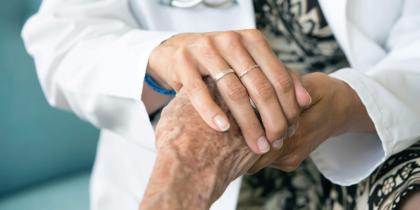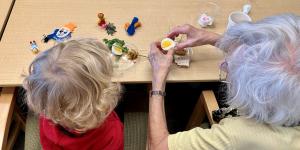Neglect in Older Adults: Spotting the Signs and Taking Action
Learn about neglect — including self-neglect — and how you can become an elder abuse prevention advocate.

The local police department receives a phone call. An older woman wants to order a meal from a restaurant but can’t pick it up for herself. She lives alone and asks the police officer to drive the food to her house. She tells them she’s unable to cook. Her stove does not work, and she cannot get to the store or provide food for herself any other way. She hasn’t eaten in three days.
What form of elder abuse is this? No, it’s not a trick question! The example above is a sign that the woman who called the police may be experiencing a form of abuse called self-neglect.
Let’s explore neglect a little more, including the difference between neglect and self-neglect, how to recognize the signs that someone may be neglecting an older adult, and what you can do if you suspect neglect or self-neglect is occurring.
Understanding neglect
Elder abuse is an intentional act or failure to act that causes or creates a risk of harm to anyone 60 years old or older.
Neglect is one of the major types of elder abuse, which also includes physical abuse, sexual abuse, emotional or psychological abuse, and financial exploitation. While elder abuse is often talked about in categories, victims of abuse frequently experience multiple types simultaneously. You can read our blog post on 11 signs and symptoms of elder abuse for a broad overview of the different types and what to look out for.
Neglect is the failure to meet an older adult’s basic needs, which include food, water, shelter, clothing, hygiene, and essential medical care. This definition applies to self-neglect, too.
Who neglects older adults? Often, those perpetrating neglect are the older adult’s loved ones and family members who are supposed to be taking care of them. The National Council on Aging says that the perpetrator is a family member in almost 60% of elder abuse and neglect incidents. Adult children, spouses, grandchildren, and other relatives are often the perpetrators of abuse.
Is elder neglect always intentional?
Elder neglect can be intentional or unintentional. While some caregivers blatantly neglect older adults, others don’t realize that they’re neglecting the person they’re supposed to be taking care of. Unintentional neglect is sometimes called “passive neglect,” and intentional neglect is sometimes called “active neglect.”
Neglect is a topic that comes with a lot of gray areas when it comes to responsibility and liability. For example, an adult child who lives hundreds of miles away and isn’t aware that their parent is self-neglecting isn’t necessarily responsible for their declining parent. But if an adult child is their parent’s established health care proxy and knows they need daily care, then chooses to leave the state for a business trip without arranging for care during that time, it would very likely be considered neglect. In Massachusetts, it’s ultimately up to the Office of Elder Affairs to determine whether neglect is occurring in each situation and to identify who is responsible.
There are a few reasons that a caregiver may unintentionally neglect an older adult:
- Not understanding an older adult’s needs
- Not having the capacity to care for them
- Experiencing caregiver burnout
- Disagreeing with their prescribed medical care
- Being unaware of services that could help meet their needs
- Not believing they need as much assistance as they do
Whether or not the neglect is intentional, it’s still neglect. If you suspect an older adult’s essential needs aren’t being met — whether or not the caregiver is doing it on purpose — you should still report it. Those perpetrating abuse often may receive support and assistance for caring for the older adult when that neglect is unintentional, but the top priority is making sure the older adult is safe.
You might also wonder if reporting potential neglect will require the older adult to move from their home and feel guilty or fearful that you could make things worse for them or their caregiver. But reporting your concerns simply alerts the proper professionals to help audit the situation and keep the senior safe. They will not necessarily be required to move as long as they are receiving the support they require to remain at home safely.
Signs and symptoms of neglect
- Unusual changes in weight, poor nutrition, and dehydration
- Untreated physical problems, such as bed sores
- Unsanitary living conditions, including dirt, bugs, and soiled bedding and clothing
- Being left dirty or unbathed
- Unsafe living conditions, such as no heat or running water, faulty electrical wiring, or other fire hazards
- Desertion of the older adult in a public place
Understanding self-neglect
When an adult 60 or older cannot meet their basic needs and puts their health, safety, and well-being at risk, it is considered self-neglect. Like neglect perpetrated by others, basic needs include food, water, shelter, clothing, hygiene, and essential medical care.
According to the Commonwealth of Massachusetts, self-neglect is the most common form of elder abuse. A study on developing a framework for self-neglect says that self-neglect is the most frequently reported form of abuse received by state agencies that investigate elder abuse.
While self-neglect is considered a form of elder abuse, that doesn’t mean older adults who are struggling to take care of themselves are going to get in trouble with authorities or face charges. What it does mean is that it’s dangerous, serious, and reportable to agencies that can help them get the help they need.
Signs and symptoms of self-neglect
- Forgetting to take medication
- Hoarding
- Inability to maintain personal hygiene
- Inability to manage personal finances, such as being unable to pay rent
- In some cases, being unable to manage finances due to falling victim to a financial scam
- Living in hazardous or unsanitary conditions
- Not eating enough food to the point of dangerous weight loss
- Wearing clothes that are dirty or not appropriate for the weather
What makes someone vulnerable to self-neglect?
Certain factors can make taking care of yourself in older adulthood more difficult, especially if you have health problems or require additional assistance. Here are some of the risk factors that may make some older adults more likely to self-neglect:
- Cognitive decline and dementia
- Poverty or being unable to pay for essentials
- Frailty
- Living alone or being socially isolated
- Depression or alcohol misuse
Is self-neglect always intentional?
Like neglect, self-neglect can be intentional or unintentional. Which one it is depends on whether someone has the capacity to make decisions regarding their health.
Conditions like Alzheimer’s disease or dementia can decrease someone’s capacity, making it hard for them to recognize that they’re neglecting their basic needs — those situations tend to be unintentional self-neglect. On the other hand, intentional self-neglect occurs when someone does have the capacity to meet their needs yet chooses not to. For example, someone may decide not to seek essential medical care they understand they need.
Capacity is a complicated and nuanced concept. To have decision-making capacity, someone needs to be able to make and implement that decision. For doctors, who need to balance keeping their patients safe with respecting their right to autonomy, determining capacity requires ethical decision-making that isn’t always straightforward.
This is supposed to be informational, but remember this: if you’re worried about the safety of an older adult, you aren’t responsible for determining whether they have capacity! By reporting your concerns, the proper agencies and health care providers can assess the situation and determine how best to help them.
What should you do if you suspect elder abuse or neglect?
- If you suspect something, say something! Don’t wait or decide that a situation that doesn’t feel right is probably okay.
- If someone is in immediate danger or harm, call 911.
- If you’re concerned about an older adult’s safety in the state of Massachusetts, you can call the 24/7 state hotline at 800-922-2275 or file a report online to report abuse of adults aged 60+. You can file a report anonymously if you aren’t comfortable leaving your personal information.
- Hebrew SeniorLife’s Center for the Prevention of Elder Abuse and Neglect provides emergency shelter and support services to seniors suffering from abuse, neglect, or financial exploitation.
Learn more about our elder abuse shelter and prevention program
Becoming educated on forms of elder abuse like neglect, learning how to recognize the signs, knowing what to do if you suspect elder abuse, and staying vigilant are great ways for you to become an advocate for older adults.
In addition to providing emergency shelter, our Center for the Prevention of Elder Abuse and Neglect works with those affected by elder abuse to connect them to health care, social, and financial resources. Older adults can access these services regardless of whether they are staying in our shelter. To make a referral, inquire about services, or explore education opportunities, visit the Center’s website.
While you’re there, consider donating to help seniors impacted by elder abuse! Donors are the reason we’re able to offer this incredible resource.
Blog Topics
Learn More
Elder Abuse Shelter and Prevention Program in Massachusetts
The first and only abuse shelter program for seniors in Massachusetts.




